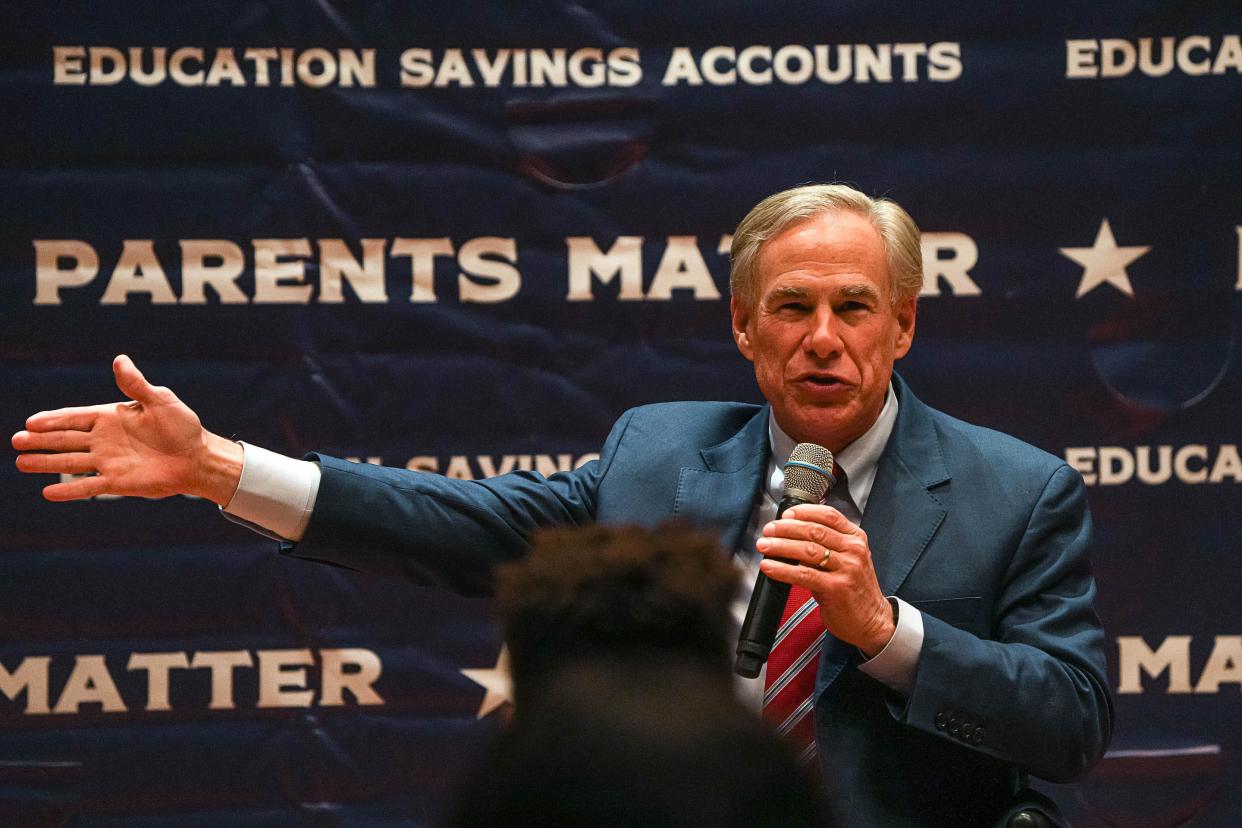Will school choice in Texas trump other GOP issues in primary? Here's what experts say

- Oops!Something went wrong.Please try again later.
After being a major focal point of Texas education policy for more than a year, school choice is likely to be one among many issues motivating voters in the Republican primary election.
During the 2023 legislative year, school choice, also known as vouchers or education savings accounts, drew thousands of supporters and opponents to the Capitol as lawmakers took up various iterations of the issue — none of which made it to the finish line. Advocates from across the country flew to Austin to persuade lawmakers to change their votes. Gov. Greg Abbott threw the weight of his office behind school choice, touring schools across Texas to encourage voters to call their representatives, and even called on religious leaders to preach about the issue from the pulpit.
When, after months of politicking, Abbott failed to pass school choice legislation through the Texas House, he vowed to challenge at the ballot box any representatives who refused to support the measure.
But school choice — a proposal that would use public dollars to help K-12 students pay for private school tuition — is not likely to be top of mind for primary voters, political experts say.
Republicans are more likely to vote based on bread-and-butter conservative issues, such as border security or the economy. However, Abbott’s money and influence could bring an indirect effect from the school choice fight to some House races.
Border security, immigration, inflation and political corruption ranked among the top issues for Texas voters in a December poll by the Texas Politics Project at the University of Texas.
Even when voters ranked only education-specific issues, school choice — though backed by a majority of respondents — drew far less support than other key education policies.
While 54% of Texans said they “strongly” or “somewhat” support a school choice or voucher program, a larger portion of voters, 68%, supported increasing per student funding, according to the poll. Another 81% of Texans supported raising public school teachers’ pay, and 82% supported more public school funding in general.
“The Republican primary election is the point at which ESAs, vouchers, school choice is going to be most important for Republican voters,” said Joshua Blank, research director of the politics project. “The question is going to be whether it's more important than other issues they care about.”
Even after the attention it got last year, school choice is a relative niche issue, he said.
In November, 21 House Republicans voted to strip school choice from an omnibus bill. Of those, 16 are running for reelection and all of them have opponents. Abbott has endorsed some of the challengers. On key Republican issues such as the border or property taxes, the incumbents have conservative track records, Blank said.
“It's not clear to me that Abbott's endorsement alone is going to shift voting patterns and negate all the work these members have done to build up support in their community,” Blank said.
Abbott, though, has received serious financial support from school choice advocates.
More: 'Largest single donation in Texas history': Abbott gets $6M from school choice advocate
Campaign finance reports released in January detailed a $6 million contribution to Abbott’s campaign account from Jeff Yass, a Pennsylvania-based billionaire investor whose priorities include school choice. He co-founded the Yass Education Foundation, which gives out education grants.
In the run-up to the primaries, Abbott hasn't balked from his commitment to fighting for school choice.
At a campaign rally in Cedar Park on Thursday on behalf of Republican state Rep. Terry Wilson, Abbott coupled the school choice issue with that of pushing back against public schools advocating social philosophies with which some parents might not agree.
"This is one of the reasons why I've been working to advance the God-given right to every parent in the great state of Texas that they are responsible for the future of their child," Abbott told the audience. "And that includes the freedom to choose on the school that's best for their child."
If Abbott is serious about replacing incumbent Republican House members, he’ll have to put his money where his mouth is, said Brandon Rottinghaus, a political science professor at the University of Houston.
“He's raised a huge war chest full,” Rottinghaus said. “That has to actually materialize in a meaningful way. The governor's track record of success in trying to oust people he disagrees with is not great.”
Even if school choice isn’t at the forefront of voters’ minds, Abbott’s involvement — and money — could move the needle, said Mark P. Jones, a political science professor at Rice University.
“He's making a level playing field for the challengers in races that would normally be lopsided in favor of the incumbents,” Jones said.
The attention could push the races into runoffs, he said.
School choice is of concern to at least some primary voters, according to a study the University of Houston released Feb. 7. Jones was part of the study's research team.
About 53% of Republican primary voters disagreed with the House's vote to block school choice legislation, and 59% of Democratic primary voters agreed with it, according to the study.
Of the 53% of Republican voters who wanted school choice legislation, about 58% of them think lawmakers should make its passage a top or high priority in the 2025 legislative session, according to the study. Democrats opposed to school choice tend to be staunchly opposed. Of the 58% of Democratic voters who disagree with school choice, 68% think lawmakers should make blocking future legislation a top or high priority.
Early voting in the primaries will begin Tuesday. Election day is March 5.
This article originally appeared on Austin American-Statesman: School choice likely not top of mind in 2024 Texas primary election

